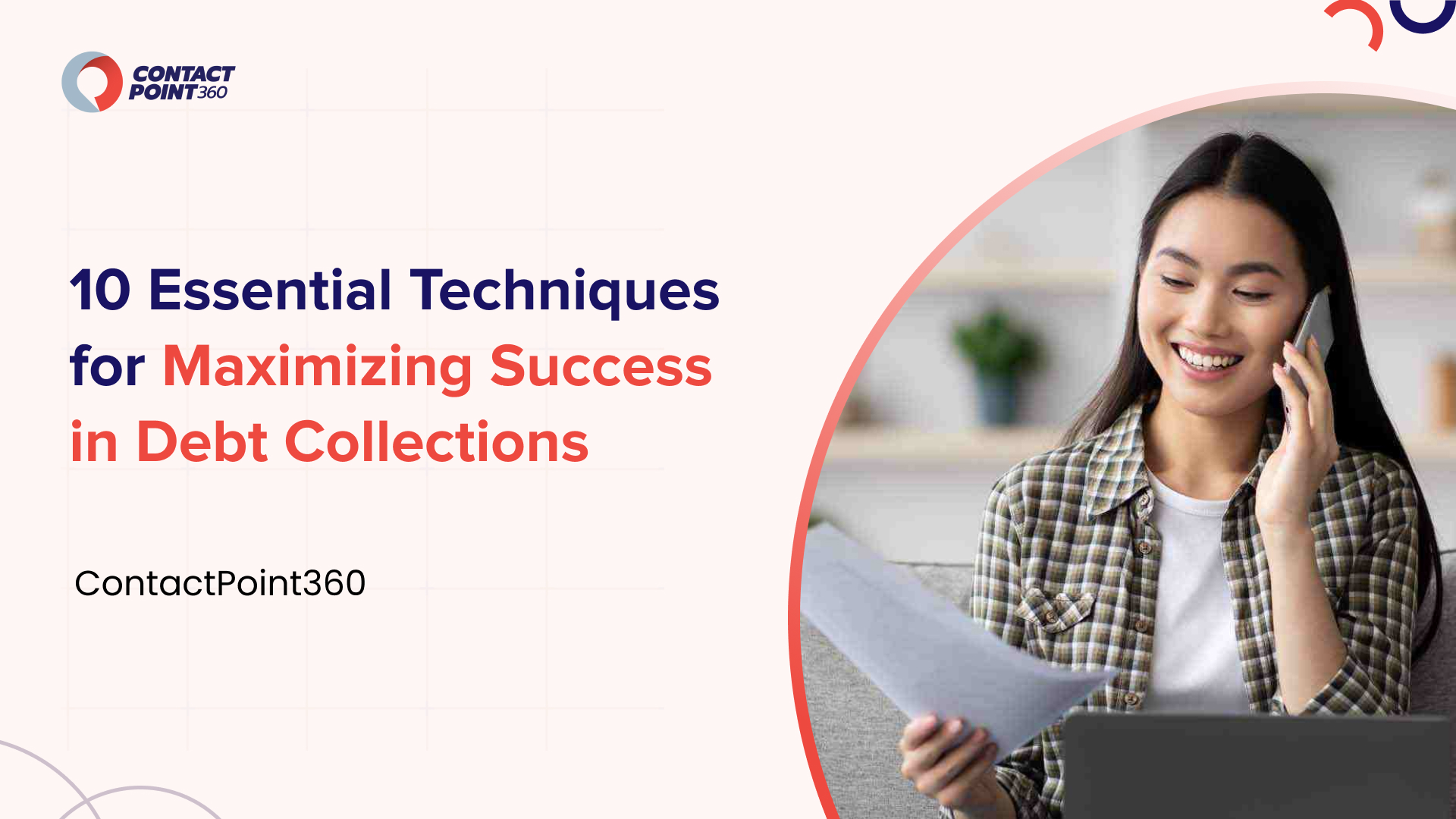In financial management, one aspect often dreaded yet crucial is debt collection. For businesses and individuals, navigating the intricate web of outstanding debts can be challenging.
Debt collection isn’t merely crunching numbers; it’s about deciphering the puzzle of motivating individuals to settle their debts. Regardless of whether you’re a seasoned professional or just beginning your journey, you’ve likely encountered both successes and hurdles when handling overdue payments. With the right strategies and techniques, the process can be streamlined and made more effective.
In this blog post, we’ll discuss 10 essential techniques for maximizing success in debt collection strategies and analysis with some of the top debt collection tips, encompassing a range of approaches from communication to negotiation and beyond.
Successful Debt Collection Techniques
Successful Debt Collection Techniques

Effective Communication
Communication forms the backbone of successful debt collection. Establishing clear and consistent communication channels with debtors is paramount. Whether through phone calls, emails, or letters, maintaining a respectful and professional tone fosters cooperation and encourages debtors to engage positively in the repayment process.
Understanding Regulations and Compliance
It’s crucial to stay abreast of debt collection regulations to avoid legal pitfalls. Familiarize yourself with local and national laws governing debt collection practices, including the Fair Debt Collection Practices Act (FDCPA). Adhering to these regulations not only ensures ethical conduct but also safeguards against potential lawsuits or penalties.
Early Intervention
Addressing delinquent accounts promptly is key to preventing further escalation. Implement strategies for early intervention, such as sending reminders or making courtesy calls shortly after payment deadlines have passed. Prompt action increases the likelihood of recovering debts before they become unmanageable.
Customized Payment Plans
Recognize that each debtor’s financial situation is unique. Tailoring payment plans to suit individual circumstances demonstrates flexibility and empathy. By working collaboratively with debtors to establish manageable repayment schedules, you facilitate a more constructive resolution process.
Utilizing Technology
Leverage technology to streamline debt collection processes and enhance efficiency. Debt collection software can automate tasks such as tracking payments, generating reminders, and organizing debtor information. Moreover, online payment portals offer convenience for debtors and facilitate timely transactions.
Effective Debt Recovery with ContactPont360
Persistence with Politeness
Persistence pays off in debt collection, but it must be tempered with politeness and professionalism. Adopt a persistent yet respectful approach when following up with delinquent accounts. Consistent communication signals your commitment to resolving the matter while maintaining a positive rapport with debtors.
Negotiation Skills
Mastering the art of negotiation is indispensable in debt collection. Approach negotiations with an open mind and a willingness to find mutually beneficial solutions. Be prepared to offer concessions or alternative arrangements that accommodate both parties’ needs, fostering goodwill and cooperation.
Documentation and Record-Keeping
Thorough documentation is essential for tracking progress and maintaining accountability throughout the bad debt collection strategies. Keep meticulous records of all communication, agreements, and payment transactions. These records serve as invaluable evidence in the event of disputes or legal proceedings.

- Thorough Record-Keeping: Keep detailed logs of all interactions—such as calls, emails, and meetings—to establish a comprehensive history of the debt recovery process – an integral part of credit management debt recovery strategies.
- Timestamped Documentation: Ensure all records include timestamps, providing a clear timeline of communication and agreements for accurate tracking and accountability.
- Confirmation Emails: After verbal agreements, send confirmation emails summarizing key points to ensure mutual understanding and reduce misunderstandings during debt recovery.
- Secure Storage: Safely store all documentation in a secure and easily accessible manner, allowing for quick retrieval for reference and compliance purposes throughout the debt recovery process.
- Agreement Acknowledgment: Request acknowledgment from debtors on any agreements or payment plans, adding an additional layer of confirmation and reducing the risk of future disputes.
Escalation Protocols
Establish clear escalation protocols for handling difficult cases or persistent non-payment. Define thresholds for escalating accounts to higher management or external collections agencies when internal efforts prove unsuccessful. Prompt escalation ensures that delinquent accounts receive appropriate attention and resources.
Continuous Improvement
Continuously evaluate and refine your best debt collection strategies based on feedback and outcomes. Analyze the effectiveness of different approaches and identify areas for improvement. Embrace a mindset of continuous learning and adaptation to optimize success in debt recovery.
How ContactPoint360 Supports Managing Difficult Debtor Interactions for Smoother Debt Collection?
ContactPoint360 offers tailored solutions to support businesses in managing difficult debtor interactions for smoother debt collection processes. With our expertise in customer engagement, we provide strategic guidance and effective communication strategies to navigate challenging situations with debtors.
Our technology-driven approach streamlines debt collection efforts, automating tasks such as tracking payments and generating reminders, while also providing convenient online payment portals for debtors. By leveraging ContactPoint360’s accounts receivable outsourcing services and financial services call center outsourcing, businesses can enhance their debt collection efficiency, improve debtor relationships, and ultimately maximize debt recovery outcomes.
Conclusion
- Successful debt collection requires a multifaceted approach that combines effective communication, regulatory compliance, and strategic negotiation.
- By implementing these 10 essential techniques, businesses and individuals can maximize their chances of recovering outstanding debts while maintaining positive relationships with debtors.
Navigate the Path to Successful
Debt Recovery with ContactPont360
Frequently Asked Questions
What should I do if a debtor refuses to cooperate with the agreed-upon payment plan?
If a debtor refuses to cooperate with the agreed-upon payment plan, it’s essential to maintain open communication and attempt to understand their reasons for non-compliance. Consider renegotiating the terms of the payment plan to better accommodate their circumstances if possible.
If efforts to reach a resolution fail, you may need to consider escalating the matter internally or seeking legal advice.
How can I ensure that my debt collection practices remain compliant with relevant laws and regulations?
To ensure compliance with relevant laws and regulations, it’s crucial to stay informed about current legislation governing debt collection practices, such as the Fair Debt Collection Practices Act (FDCPA) in the United States. Regularly review and update your internal policies and procedures to align with legal requirements.























 United States
United States Canada
Canada Mexico
Mexico Colombia
Colombia Jamaica
Jamaica Philippines
Philippines India
India Egypt
Egypt
 Français
Français


